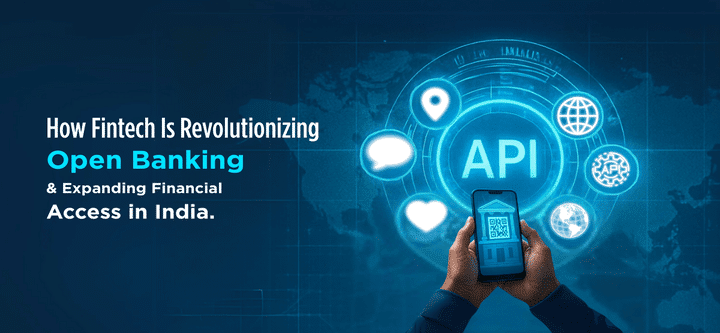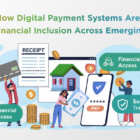In 2025, India stands at the forefront of a financial revolution. The convergence of fintech innovations and open banking is reshaping the nation’s financial landscape, driving unprecedented access to banking services and fostering economic inclusivity. With a fintech market projected to soar from $145.09 billion in 2025 to $550.21 billion by 2030, growing at a CAGR of 30.55%, the momentum is undeniable.
Open banking, characterized by the use of APIs to enable third-party developers to build applications and services around financial institutions, is central to this transformation. It empowers consumers with greater control over their financial data, promotes transparency, and fosters innovation. As fintech firms like Evolute Fintech Innovations lead the charge, the synergy between technology and finance is unlocking new opportunities for millions across the country.
APIs and Opportunities: The Rise of Open Banking
The global open banking market is experiencing exponential growth, with projections indicating an increase from $30.89 billion in 2024 to $38.86 billion in 2025, at a CAGR of 25.8%. In India, this surge is fueled by a tech-savvy population, supportive regulatory frameworks, and a robust digital infrastructure.
The Reserve Bank of India’s initiatives, such as the Account Aggregator framework, have laid the groundwork for a secure and efficient data-sharing ecosystem. This framework allows individuals to consolidate their financial information, enabling better financial planning and access to credit. Moreover, the RBI’s plan to launch a pilot program in 2025 for affordable local cloud data storage aims to support smaller financial firms, enhancing the scalability and security of open banking services.
Lending Ascending: Personalized Credit Through Data
Open banking is transforming the lending landscape by enabling personalized credit offerings. By leveraging real-time financial data, lenders can assess creditworthiness more accurately, leading to tailored loan products and faster approvals.
A study by the Indian Institute of Management Bangalore and other institutions found that in areas with high UPI adoption, loans to new credit borrowers increased by 4%, and loans to subprime borrowers rose by 8%. Moreover, a 10% increase in UPI transactions resulted in a 7% increase in credit availability, without a corresponding rise in default rates.
Aggregators and Accelerators: The Account Aggregator Framework
The Account Aggregator (AA) framework, introduced by the Reserve Bank of India, facilitates secure and consent-based data sharing between financial institutions. By consolidating financial information, AAs empower consumers to access a range of financial services tailored to their needs.
The inclusion of the Goods and Services Tax Network (GSTN) into the AA ecosystem in November 2022 further enriched the data pool, enabling lenders to better assess the creditworthiness of small businesses and individuals.
Inclusion Infusion: Bridging the Financial Divide
Despite significant progress, financial inclusion remains a critical challenge in India. Open banking, coupled with fintech innovations, is playing a pivotal role in bridging this gap. By leveraging digital platforms, underserved populations can access essential financial services, from savings accounts to credit facilities.
Evolute Fintech Innovations is at the forefront of this mission, offering a suite of products designed to democratize financial access. Their integrated micro ATMs, such as the Leopard and Falcon, enable banking services in remote areas, while Android POS devices like Unipos A5 facilitate seamless transactions for small businesses. These solutions are instrumental in bringing the unbanked into the formal financial system, fostering economic empowerment.
UPI and You: Seamless Payments for All
The Unified Payments Interface (UPI) stands as a testament to India’s digital prowess. In January 2024 alone, UPI processed 12.20 billion transactions worth ₹18.41 lakh crore (approximately $222.17 billion), marking a 41.72% increase in transaction value compared to January 2023.
UPI’s success has not only facilitated instant, low-cost transactions but also provided a digital trail that aids in credit assessments, thereby expanding financial access to previously underserved populations.
BNPL and Beyond: New Models for New Markets
The Buy Now Pay Later (BNPL) model, underpinned by open banking, is gaining traction in India. By allowing consumers to split payments into interest-free instalments, BNPL services are making high-value purchases more accessible.
In 2021, India had approximately 5 million BNPL users for online retail and 2 million for offline retail. These numbers are projected to surge to 30 million online and 22 million offline users by 2026.
Security and Scrutiny: Managing Risks in Open Banking
While open banking offers numerous benefits, it also introduces challenges, particularly concerning cybersecurity and data privacy. The increased data sharing necessitates robust security measures to protect against breaches and fraud.
The Reserve Bank of India emphasizes the importance of compliance with prudential regulations and privacy laws, highlighting potential risks such as data breaches, misuse, and operational issues related to APIs.
Evolute’s Edge: Empowering Financial Access with Innovation
At the forefront of this open banking revolution is Evolute Fintech Innovations, a key enabler in bridging India’s financial inclusion gap through cutting-edge technology and user-centric solutions. As a trusted partner to banks, NBFCs, and fintech platforms, Evolute is reshaping how financial services are delivered to the last mile. With a strong focus on embedded finance, Evolute offers a robust suite of fintech products—from Aadhaar-enabled payment systems (AEPS) and micro-ATM devices to mobile POS terminals and interoperable digital wallets—designed to meet the dynamic needs of both urban and rural consumers.
In addition, the company’s commitment to compliance, data security, and innovation ensures that its offerings not only meet regulatory requirements but also exceed industry expectations in user trust and scalability. As open banking continues to evolve, Evolute stands as a catalyst for inclusive growth, ensuring that no Indian is left behind in the digital finance revolution.
Global Trends, Local Impact: India’s Position in the Open Banking Landscape
India’s embrace of open banking is part of a broader global trend towards data-driven financial services. The value of open banking transactions worldwide is expected to rise from $57 billion in 2023 to $330 billion by 2027. India’s proactive regulatory environment and rapid digital adoption position it as a leader in this domain.
The country’s young demographic, with a high propensity for digital engagement, further accelerates this shift. Approximately three out of four millennials express strong confidence in using technology to manage their finances, compared to just over half of non-millennials. This digital-native population is driving demand for innovative financial solutions, prompting fintech firms to continuously evolve and adapt.
Conclusion: Charting the Future of Finance
India’s embrace of fintech and open banking is reshaping its financial landscape, fostering inclusion, and driving innovation. As the ecosystem evolves, continued collaboration between regulators, financial institutions, and fintech companies will be crucial to address challenges and harness the full potential of open banking.
Key Takeaways:
- Open banking, through APIs, is democratizing financial services in India.
- Personalized lending is expanding credit access, especially in underserved regions.
- The Account Aggregator framework enhances data sharing and empowering.
- UPI’s growth exemplifies the success of digital payment systems.
- BNPL services are making high-value purchases more accessible.
- Robust cybersecurity measures are essential to mitigate risks associated with open banking.
As India continues its journey toward a digitally inclusive economy, open banking stands as a cornerstone of this transformation, promising a future where financial services are accessible, efficient, and tailored to the needs of every citizen.





